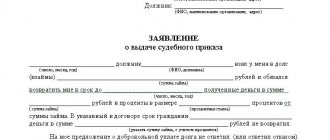A court order is a narrow but already well-trodden path in the system of strict rules of jurisprudence and the bureaucratic structure of the country. By applying to the magistrate with an application for issuing an order, you are guaranteed to receive a beautiful piece of paper within 5 days, which serves as a writ of execution.
It gives you the right to begin forced collection in order to properly “punish” the negligent debtor. Banks, microfinance organizations and collectors love to use an application for a court order, because this is the easiest way to the FSSP and debt repayment.
What should be contained in an application for a court order?
We have Art. 124 of the Code of Civil Procedure of the Russian Federation, which talks about the form and content of an application for a court order. It establishes the basic rules and requirements for the submitted document. Here they are:
- Name of the court, indication of the precinct number, full name of the magistrate.
- Full name or name of the collector, address, contact information and payment details.
- Full name, address of the debtor, his passport details and contacts, place of work, date of birth and identifier (optional: TIN or insurance number according to SNILS).
- Documentary evidence of authority, if the application is submitted by a representative of the claimant. As a rule, this is a power of attorney.
- Calculation of the amount of debt, indicating a specific monthly payment.
- References to legislation, loan agreement or other documents.
- Information that the debtor received notices of voluntary payment of debt.
- Calculation of penalties for penalties and other sanctions, if such a possibility is provided for in the agreement between the parties.
- List of documents that will be attached to the application.
Some documents are also attached to the application. If you send a bare statement to the court, you will be refused to consider it, since it will not be supported by documents.
In particular, you should attach:
- a copy of the debtor’s passport and identification data, which he provided when concluding the agreement;
- credit agreement or loan agreement;
- claims that you sent to the debtor;
- debt calculation;
- a duplicate of the application for a court order;
- confirmation from the Russian Post about receipt of documents by the debtor (for this it is necessary to send documents by registered mail);
- receipt of payment of state duty.
Please note that a state fee is also paid to the magistrate's court. But its size is 50% of the standard state duty for property-related requirements. According to the norms of Art. 333.21 of the Tax Code of the Russian Federation, this is 2-4%, depending on the amount of claims.
What cases are considered through writ proceedings?
A court order is issued if:
- The claim is based on a transaction concluded either in simple written form or in notarized form;
- The requirement is based on the notary's protest of the bill for non-payment, non-acceptance and undated acceptance;
- The requirement concerns the collection of alimony for minor children, which is not related to the establishment of paternity/maternity and does not require the involvement of third parties;
- The demand is aimed at collecting accrued but unpaid funds: wages, vacation pay, dismissal pay, etc., as well as collecting compensation for the employer’s violation of payment deadlines;
- The demand was made by a territorial body of the federal executive body for ensuring the established procedure for the activities of courts and the execution of judicial acts and acts of other bodies; a demand for the recovery of expenses incurred in connection with the search for a defendant, or a debtor, or a child;
- The demand is aimed at collecting arrears in payment for residential premises, expenses for major repairs and maintenance of common property in an apartment building, utilities, as well as communication services, mandatory payments and contributions from members of the property owners' association.
Completed sample application for a court order
Let's take an application form as an example.
Sample application for a court order
Before writing an application, you must familiarize yourself with the following rules:
- The calculation of the amount of debt can be presented directly in the application, as is done in the example provided. But you can put the calculations in a separate document. It is advisable to do this if the debtor partially paid, but then stopped making monthly payments.
- You must notify the debtor of your intention to apply for a court order. Therefore, before going to court, we send a copy of the application to the defendant.
- All documents that you send to the debtor must be sent by registered mail. This option allows you to obtain a certificate of receipt of the letter - these notifications from the post office must also be attached to the case materials.
(18.1 KB)
What else can the creditor do?
Not every bank, after canceling a court order, goes to a court of general jurisdiction. The costs may be too great to be cost-effective, so the organization often decides to take other measures. One of them is transferring the debt to a collection agency, which in turn will try to come to an agreement with the client. This turn of events frightens many more than communicating with bailiffs, but in reality, bona fide debt collectors are much more loyal to the client than the federal service. The agency has the right to write off part of the debt, offer a convenient individual repayment schedule, and accommodate the borrower halfway, especially if he agrees to cooperate. If you find yourself in such a situation, don’t worry or be afraid. With rational actions on your part, the debt will be repaid, and you will not have to face more serious collection measures.
Practice on court orders: why and when can consideration be refused?
An important requirement that applies to all claims for a court order is the indisputability of the claims. You cannot, for example, go to the magistrate’s court to recover 300 thousand rubles from the neighbor who flooded you.
In such a situation, if you only have evidence of material damage caused to wallpaper and equipment, but there is no confirmation of contractual obligations, the magistrate’s court will refuse to consider the case and issue an order.
Again, you cannot go to court to a magistrate if you have a non-property claim. For example, you want to recover moral damages or we are talking about copyright violations. Magistrates' courts do not deal with such processes.
We propose to consider some examples from existing practice in magistrates' courts. Why are plaintiffs denied consideration of applications for forced collection of debt:
- Case No. 2-37/2020, which was considered by the magistrate of judicial district No. 1 of Belgorod. The magistrate's court returned the application for forced collection of the debt. The reason is trivial and very common: the lender forgot to attach the loan agreement to the document. That is, the statement was not supported by documents.
- In case No. 2-41/2018, the magistrate court of judicial district No. 2 in the same city returned the application on the promissory note. The court saw signs of a dispute in the case - under such circumstances, a court order is not issued. Subsequently, the plaintiff filed a private complaint against the judge, but the appellate court agreed with the initial conclusions.
- In case No. 9-2949/2020, the magistrate court of precinct No. 1 in the Astrakhan region expanded the application because it did not contain information about the debtor. The creditor did not bother to indicate the passport details or identification of the person against whom he made a debt claim. It is worth calling the refusal of the magistrate court justified, since in the absence of identification it is not possible to issue an order.
- In case No. 15-17/2019, the court returned the application for an order. The reason was that the receipt for payment of the state duty did not indicate the purpose of the payment. More precisely, the document indicated that the state fee is paid for consideration of the application for the issuance of an order. But the judge was not satisfied with this argument. He noted that the payer did not indicate the case number and details, or other identification data.
The latest refusal, according to experts, raises doubts. The fact itself has been fulfilled - the applicant transferred funds to the budget. This fact is documented. The court received the original order.
You can remember Art. 124 of the Code of Civil Procedure of the Russian Federation, which establishes rules for the content of statements and documents. In turn, paragraph 18 of the Resolution of the Plenum of the Supreme Court No. 62 allows for the submission of documents for an order in written and electronic form. There are no specific requirements to indicate the case number and details anywhere.
An application for a court order is a convenient alternative to legal proceedings
Applications for orders are sent to the Magistrates' Court. In particular, this type of collection is loved by microfinance organizations, banks, and debt collectors. Individuals often apply for it with promissory notes. It is not difficult to write an application, but still, sometimes the courts refuse. The main reasons for refusals are the lack of legal documents, technical errors and the presence of an ongoing dispute between the parties.
Methods of debt collection by bailiffs
Unlike collection agencies that have received the right to a loan under an assignment agreement, which can meet the client halfway and offer more favorable conditions than the bank, bailiffs do not always act in the interests of the borrower. The peaceful option for the development of events is that he independently repays the debt, using the details specified in the document. More serious consequences occur if actions on the part of the borrower are not followed and bailiffs begin to forcibly collect obligations. In this case, confiscation of property is possible, to which bailiffs have the right according to the law. The borrower's property is sold against the debt through an auction. This is obviously not the most optimal way out of the situation, but in most cases it can be avoided. The main rule is not to panic and not to do rash things. A rational line of behavior will help resolve the issue in the mildest possible way.
Court order: what should the debtor do?
In the case of claim proceedings, everything is easier and clearer for the debtor. The creditor follows the pre-trial procedure, writes a statement of claim, a copy of which is sent to the debtor; applies to the district court with documents.
Next, a date is set for the first meeting, to which both parties are summoned. In general, such processes last 2-4 months: meetings are postponed, extended, and the parties file petitions for extensions. The procedure is delayed for other reasons.
But if we are talking about a court order, it is already more complicated. The order is as follows:
- The creditor first follows the pre-trial procedure and then prepares an application.
- A copy is sent to the defendant.
- The plaintiff applies to the court for a court order.
- The case is considered within 5 days.
- Next, the judge issues a court order.
- A copy of the order is sent to the debtor. He has 10 days to file an objection and to send the case to a court of general jurisdiction.
As a rule, debtors do not know about the order until the very end. For many reasons, people do not receive letters from the court. They face problems when the FSSP imposes restrictions.
Let us remind you that if within 10 days the debtor has not sent an objection to the magistrate’s court, then the creditor has the right to apply for the initiation of enforcement proceedings to the FSSP. Next, the bailiffs use various measures to carry out the order.
What do the bailiffs do to carry out the order:
- freeze the debtor's accounts;
- restrict his right to cross the territory of the Russian Federation;
- withdraw money from monthly income;
- property is seized and so on.
If you receive a court order, you need to act immediately. How to proceed:
- We write an objection to the court order in free form. You can write a standard statement by hand stating that you do not agree with the creditor’s claims and ask for a refusal. But the application must indicate the number and details of the order received.
- We direct this objection to the magistrate's court, which issued the order.
It is important not to miss deadlines. But even if you found out about the order, say, 2 months later, there are still chances to challenge the decision. If, for example, you have been on a business trip all this time or have been in hospital treatment, this will allow you to obtain a cancellation.
You will need to submit an application for a copy of the court order (if you never received it) and, based on the document received, write an application to restore the deadlines. And then - to the objection.
Collection of debts for housing and communal services by obtaining a court order
One of the ways to collect debt for housing and communal services is to obtain a court order from a magistrate. This procedure is prescribed in Chapter 11 of the Civil Procedure Code of the Russian Federation, which is called “Court Order”.
Thus, in accordance with Article 121 of the Code of Civil Procedure of the Russian Federation, a court order is a court decision issued by a single judge on the basis of an application for the collection of sums of money or for the recovery of movable property from the debtor according to the requirements provided for in Article 122 of the Code of Civil Procedure of the Russian Federation, if the amount of money to be recovered is or the value of the movable property subject to claim does not exceed five hundred thousand rubles. A court order is at the same time an executive document and is executed in the manner established for the execution of court decisions.
Those. a court order is issued by a judge alone, without holding a court hearing, without inviting the plaintiff and defendant, if the claim does not exceed 500,000 rubles. A court order (in other words, a judge’s decision in this case) is also a writ of execution, which can be directly sent for collection to the bank or bailiffs. These are the main differences between writ proceedings and ordinary (claim) proceedings in a district court of general jurisdiction:
— amount up to 500,000 rub.
- proceedings in absentia
— there is no need to obtain a writ of execution.
In addition, the amount of the state fee for consideration of a case by a magistrate court in the order of writ proceedings is significantly less than the state fee for consideration of a case by a court of general jurisdiction.
The requirements for which a magistrate is competent to issue court orders are set out in Article 122 of the Code of Civil Procedure of the Russian Federation:
— the claim is based on a notarized transaction;
- the claim is based on a transaction concluded in simple written form;
- the claim is based on the notary’s protest of the bill of exchange for non-payment, non-acceptance and undated acceptance;
- a claim has been made for the collection of alimony for minor children, not related to establishing paternity, challenging paternity (maternity) or the need to involve other interested parties;
— a demand was made to collect arrears from citizens on taxes, fees and other obligatory payments;
- a demand has been made for the recovery of accrued but not paid wages to the employee;
- the internal affairs body has filed a demand for the recovery of expenses incurred in connection with the search for the defendant, or the debtor, or a child taken from the debtor by court decision.
Those. These are requirements of the so-called indisputable order, for legal relations in which a person (usually the debtor) is obliged by law to perform any actions: pay taxes, alimony, pay fees for housing and communal services on time, fulfill the terms of the transaction, pay wages.
That is why the judge considers the case in absentia, without invitation or debate between the parties - in cases of writ proceedings there is no dispute, but there is an obligation imposed by law that is not fulfilled.
An application for a court order is submitted to the magistrate’s court at the place of residence (registration) of the debtor. According to Article 124 of the Code of Civil Procedure of the Russian Federation, the application is submitted in writing. The application for a court order must indicate:
1) the name of the court to which the application is submitted;
2) the name of the claimant, his place of residence or location;
3) information about the debtor: for a citizen-debtor - last name, first name, patronymic (if any) and place of residence, as well as date and place of birth, place of work (if known) and one of the identifiers (insurance number of an individual personal account, identification taxpayer number, series and number of an identity document, main state registration number of an individual entrepreneur, series and number of a driver's license, series and number of a vehicle registration certificate), for the debtor organization - name and address, as well as taxpayer identification number and main state registration number, if known. In the application of the citizen-collector, one of the identifiers of the citizen-debtor is indicated if it is known to the citizen-collector;
4) the claimant’s claim and the circumstances on which it is based;
5) documents confirming the validity of the claimant’s claim;
6) list of attached documents.
In the case of a claim for movable property, the application must indicate the value of this property.
3. An application for a court order is signed by the claimant or his representative having the appropriate authority. The application submitted by the representative must be accompanied by a document certifying his authority.
Clause 3 in Art. 123 was prescribed so strictly by the legislator relatively recently and came into force in April 2021. Previously, it was enough to indicate only the date and place of birth of the debtor. This amendment to the legislation caused a great resonance, especially among organizations managing apartment buildings, since the latter often do not have this information. Currently, the Government of the Russian Federation is developing a mechanism for management companies to obtain the specified information about debtors. Meanwhile, the Ministry of Construction of the Russian Federation sent to the Government of the Russian Federation an initiative to exempt Management companies from the obligation to indicate debtor identifiers when applying to the courts, if the organization does not have such information, and also to develop a system for Management companies to obtain personal data of debtors through the GIS housing and communal services using unique unified personal accounts of citizens .
In order to deal with this unpleasant situation for management companies, deputies of the State Duma adopted in the first reading Draft Law No. 735817-7 “On Amendments to the Civil Procedure Code of the Russian Federation and Article 13 of the Federal Law “On Enforcement Proceedings”” (in part of providing information about consumers of housing and communal services). In the bill, deputies propose to expand the types of identifiers for filing applications in court, issuing judicial acts and implementing court decisions by adding the number of a single personal account assigned to the State Information System for Housing and Communal Services.
As a rule, at the moment, when drawing up a Unified Housing Document for a debtor when filing an application for a court order, it is possible to find out the debtor’s passport information, since this information was submitted by him earlier and is contained in the UZhD,
The necessary documents that the plaintiff (management company) attaches to the application for issuance of a court order are:
— Payment order for payment of state duty
— Unified housing document
— Certificate of financial status of the personal account
— Extract from personal account about debts on rent and utilities
— Debt calculation
— Extract from the house register
— Copies of statutory documents (Charter, Certificate of state registration and tax registration)
— Copies of the Minutes of meetings of owners on the approval or change of tariffs for housing and communal services
— Copy of the Agreement with the State Committee for Civil Regulation and Situations, if necessary
— Copies of statements by number of debtors
— Power of attorney of the representative
All documents submitted in copies must be properly certified by the applicant. Documents on one sheet are certified by the seal of the organization, and signed by an authorized person with the note “Copy is correct.” Documents on several sheets are bound, numbered and also sealed with an authorized sheet in accordance with accepted standards.
The "UPRADOLG" program allows you to automatically generate all the necessary documents for collecting debts for housing and communal services using a court order, which significantly facilitates the work of a lawyer when it is necessary to work with a large number of debtors.
An application for the issuance of a court order can be submitted to the magistrate's court either in person or sent by mail. In case of personal submission of the application, you must have with you the original passport and document confirming your authority (usually the original power of attorney). If the application is sent by mail, the original power of attorney and a copy of the passport of the plaintiff’s representative must be attached to the set of documents.
In contrast to the arbitration process and cases expressly specified in the law, the debtor does not need to submit a pre-trial claim or in any way notify him of the intention to collect the amount of debt from him before filing it in the magistrate’s court. There is also no need to send him a copy of the application for the issuance of a court order - this is done by the court office and it is for these purposes that copies of it according to the number of debtors are attached to the application for the issuance of a court order. Some judges require the applicant, along with copies of the application for the issuance of a court order, to also attach to the set of documents copies of calculations of debt and penalties by the number of debtors for subsequent sending. Some, on the contrary, send only a copy of the plaintiff’s statement. In any case, attached copies of debt calculations for debtors will not be a mistake when filing an application, but their absence may slow down the progress of the case for some time.
The judge has the right to return the submitted application for a court order on the grounds specified in Articles 125 and 135 of the Code of Civil Procedure of the Russian Federation. These grounds, among others, are:
- the case is not within the jurisdiction of this court of general jurisdiction or within the jurisdiction of the arbitration court;
- the claim was filed by an incapacitated person;
- the statement of claim is not signed or the statement of claim is signed and filed by a person who does not have the authority to sign it and present it to the court;
- in the proceedings of this or another court or arbitration tribunal there is a case regarding a dispute between the same parties, about the same subject and on the same grounds;
- before the court issued a ruling on accepting the statement of claim for court proceedings, the plaintiff received an application for the return of the statement of claim;
- the circumstances that served as the basis for leaving the statement of claim without progress have not been eliminated within the period established in the court ruling.
— documents confirming the stated claim have not been submitted;
— the stated claim has not been paid with state duty;
- the requirements for the form and content of the application for a court order, established by Article 124 of this Code, have not been met.
- a claim is made that is not provided for in Article 122 of this Code;
— the place of residence or location of the debtor is outside the Russian Federation;
— from the application and the documents presented, it is clear that there is a dispute about the right.
The return of an application for a court order is not an obstacle to the claimant returning to court with an application to the same debtor, with the same demand and on the same grounds, after the violation has been eliminated. The judge shall issue a ruling on the return of the application for a court order or on the refusal to accept it within three days from the date of receipt of the application by the court.
In addition, the court may refuse to accept an application for issuing a court order on the grounds set out in Article 134 of the Code of Civil Procedure of the Russian Federation, namely:
the application is subject to consideration in constitutional or criminal proceedings, proceedings in cases of administrative offenses, or is not subject to consideration in the courts; the application was submitted in defense of the rights, freedoms or legitimate interests of another person by a state body, local government body, organization or citizen who is not granted such a right by this Code or other federal laws; in an application submitted on one’s own behalf, acts are contested that do not affect the rights, freedoms or legitimate interests of the applicant;
2) there is a court decision that has entered into legal force on a dispute between the same parties, on the same subject and on the same grounds, or a court ruling to terminate the proceedings in connection with the acceptance of the plaintiff’s refusal of the claim or the approval of a settlement agreement between the parties;
3) there is a decision of the arbitration tribunal that has become binding on the parties and was adopted on a dispute between the same parties, on the same subject and on the same grounds, with the exception of cases where the court refused to issue a writ of execution for the forced execution of the arbitration tribunal’s decision.
The judge issues a reasoned ruling regarding the refusal to accept the statement of claim, which must be handed or sent to the applicant, together with the statement and all documents attached to it, within five days from the date of receipt of the statement of claim.
In this case, the refusal to accept the statement of claim prevents the applicant from re-applying to the court with a claim against the same defendant, on the same subject and on the same grounds. A private complaint may be filed against the judge’s decision to refuse to accept the application.
In accordance with Article 126 of the Code of Civil Procedure of the Russian Federation, a court order is issued within five days from the date of receipt of an application for a court order to the court. As mentioned earlier, a court order is issued without summoning the claimant and debtor and conducting a trial. The court makes a decision and issues a court order “on the basis of the documents presented” - paragraph 3 of Article 126 of the Code of Civil Procedure of the Russian Federation.
In practice, as a rule, judges, despite the enormous workload, try to comply with these deadlines. As a rule, information about the judge’s issuance of a court order on an application is promptly posted on the websites of magistrates’ courts. In addition, this information can always be clarified with the secretary of the court district. Therefore, if after five days the result of consideration of the application is not published on the magistrate’s court website, most likely the application was returned by the judge to correct any inaccuracies. The relevant Determination of the magistrate will indicate the points that need to be corrected, after which you can apply for the issuance of a court order again. There is no need to pay the state fee again.
The application for a court order returned by the judge is sent to the applicant by mail, if he does not promptly appear and pick it up in person.
If the court has issued a court order and satisfied the applicant's demands, the court office sends the adopted court order to the debtor by mail. As Article 128 of the Code of Civil Procedure of the Russian Federation states, the judge, within five days from the date of issuance of the court order, sends a copy of the court order to the debtor, who, within ten days from the date of receipt of the order, has the right to submit objections regarding its execution. If the debtor’s objections regarding the execution of the court order are received within the established period, the judge cancels the court order. In the ruling on the cancellation of the court order, the judge explains to the claimant that the stated claim can be presented by him in the manner of claim proceedings. Copies of the court ruling to cancel the court order are sent to the parties no later than three days after the day it was issued (Article 129 of the Code of Civil Procedure of the Russian Federation).
If the debtor does not submit objections to the court within the prescribed period, the judge issues to the claimant a second copy of the court order, certified by the official seal of the court, to present it for execution. At the request of the claimant, a court order may be sent by the court for execution to a bailiff, including in the form of an electronic document signed by a judge with an enhanced qualified electronic signature in the manner established by the legislation of the Russian Federation (Article 130 of the Code of Civil Procedure of the Russian Federation).
In practice, from the moment the court order is issued until it enters into legal force, about 30 (thirty) days pass. This is due to the fact that the court office first waits 10 days from the moment the court order is sent by mail, and then another 20 days if the debtor does not receive the court order and returns it. Plus, it takes about ten days for the court office to directly produce the document itself with the signature of the judge and the official seal for the applicant. If there are several debtors indicated in the application for a court order and they are jointly and severally liable for the stated requirements, even at the stage of filing an application for a court order, it is necessary to ask the magistrate court to issue court orders according to the number of debtors. Thus, if a claim is made against three solidary debtors (for example, the owner and two members of his family), the court office issues three identical copies of the court order for each debtor. The applicant, at his own discretion, sends these documents to the bank or bailiffs.
Sample applications for issuing a court order are available in the Documents section
Step-by-step instructions for obtaining a court order to collect debts for housing and communal services are available here.
Grounds for interrupting the period for compulsory execution
As stated in Art. 22 of Law No. 229-FZ, the period for filing an order is interrupted if the document is presented for execution. This date will be confirmed by the materials of the enforcement proceedings in the FSSP, the incoming number of receipt of the document from the debtor’s employer or bank. Due to the interruption of deadlines, the following nuances may arise:
- if the order is returned from execution, the period will resume (the period of time that elapsed before the deadline was interrupted when submitting for execution is not included in the new period);
- if the claimant himself revokes the document or makes execution impossible, the deadline will begin to run again (however, the period of time that elapsed before the deadline was interrupted will be deducted from the new deadline);
- if the bailiff returned the order due to the impossibility of its execution, then the period of time for a new presentation for collection begins to run from the day of return;
- if the debtor received a deferment or installment plan through the court, then for this period the deadline for presentation for execution is also interrupted.
Thus, it is not profitable for the claimant to revoke the order from the FSSP, from the employer or from the bank. In this case, the period of time that elapsed before the interruption will not be counted towards the new term.
The validity period of the order directly depends on the actions of the debtor. Even if a judicial act has entered into force, it remains possible to cancel it on a cassation appeal. In this case, consideration in cassation may take place after the order is presented for execution. Please note that the debtor may request in the complaint that the bailiff suspend the collection proceedings during the period of its consideration. For the entire period of suspension of proceedings, the deadlines for presentation for execution are also interrupted.







